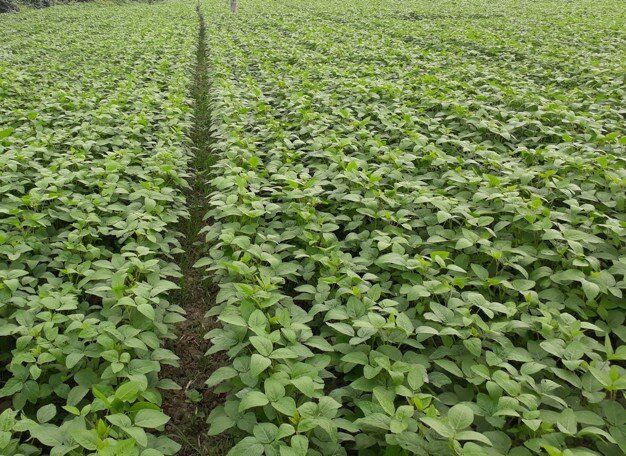Linking with local NGOs to promote mechanisation for soybean in Bangladesh
The Noyakhali and Lakhipur districts in the southeast of Bangladesh are the country’s main soybean growing area, where 75,000 ha of soybean is grown each year. Manual cultivation of soybean is becoming challenging due to a scarcity of labour. Manual planting also delays sowing dates, which increases the risk of damage due to early monsoon rain that is frequent in southern Bangladesh, and reduces soybean grain yield significantly.
Since the 1990s, Bangladesh has been leading the research and development of 2-wheel tractor (2WT) driven planters to sow various crops. Use of 2WT-based planters to establish various crops other than rice saves fuel, labour, seed and fertilizers, and reduces turn-around time between crops. Conservation Agriculture planting using the Versatile Multi-crop Planter (VMP) has been demonstrated to increase profits when used for lentil, maize, mustard and wheat, but such benefits were not assessed for soybean cultivation in Bangladesh.
Solidaridad Network Asia (SNA) is an international NGO working in south-east regions of Bangladesh to promote soybean since the beginning of 2018. They have been working with 26,000 farmers with the involvement of 15 lead farmers and 5 producers’ companies. SNA provides technical support and market linkages for inputs and outputs.
During early 2018, at a joint meeting between SNA, Murdoch University and manufacturing partner Hoque Corporation (HC), it was agreed to evaluate the VMP for soybean cultivation as a pilot project in Noyakhali and Lakhipur with two lead farmers that SNA would identify and assist. HC agreed to provide commercialization support and services after sales; and Murdoch agreed to provide technical services on the suitability of soybean cultivation by VMP and its out-scaling viability. This gave the opportunity to expand the VMP use into a new crop and a new area of Bangladesh.
To outscale the VMP for soybean cultivation in south-eastern Bangladesh, VMP demonstration and planning meetings were held with SNA Field Supervisors and Lead Farmers during July 2019. Each Field Supervisor was given responsibilities to identify potential farmers to become Local Service Providers (LSP) of VMP. Furthermore, the team worked with Social Islami Bank Ltd to arrange soft loans for buyers of 13 VMPs and 13 sets of 2WTs. This led to the sale 20 VMPs and 19 sets of 2WT in Noyakhali and Lakhipur districts during 2019/20.
Out of 20 VMP sold in south-east Bangladesh, owners used the machines in several different models, both for use on their own land, as well as for part-time and full-time planting service provision to other farmers. In other areas of Bangladesh, experienced LSP working in diverse cropping upland areas had an average coverage per machine of 22 ha, which took work of around four months per year. By contrast, the 20 new VMP owners work in a monocrop (soybean) area, and natural calamities (heavy rain due to cyclones Bulbul and Amphan) and Covid-19 restricted their use to around 10 – 15 days, and there was no potential to cover more area in early 2020.
In positive news, soybean farmers reported a total cost saving of A$165/ha, while they have obtained higher soybean grain yield by about 600 kg/ha in VMP planted plots. The total benefit of soybean farmers was A$547/ha relative to conventional planted soybean. The VMP team will continue to work closely with SNA to support scaling in their project locations.
For more information, please contact Dr Enamul Haque ([email protected]).
